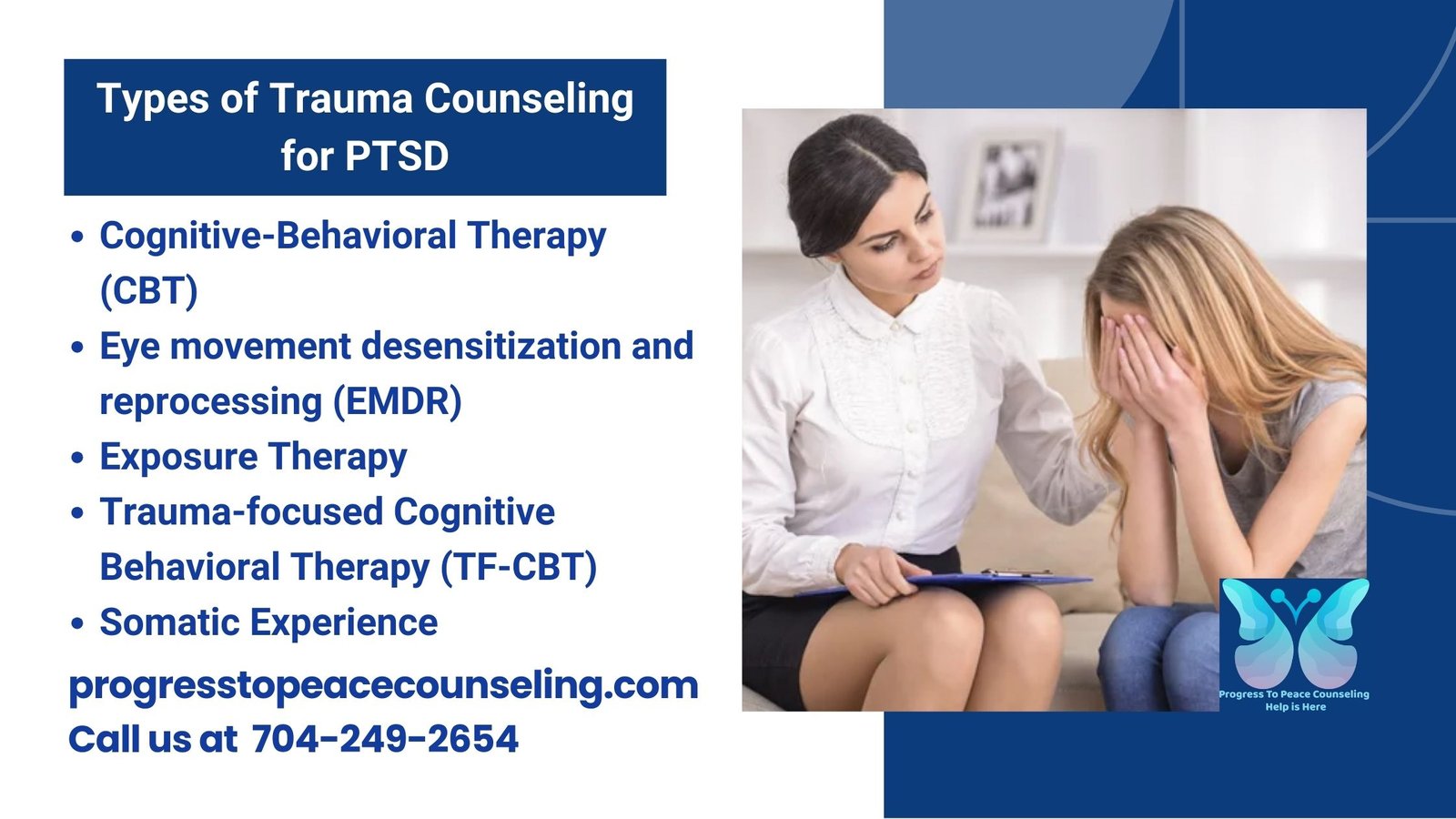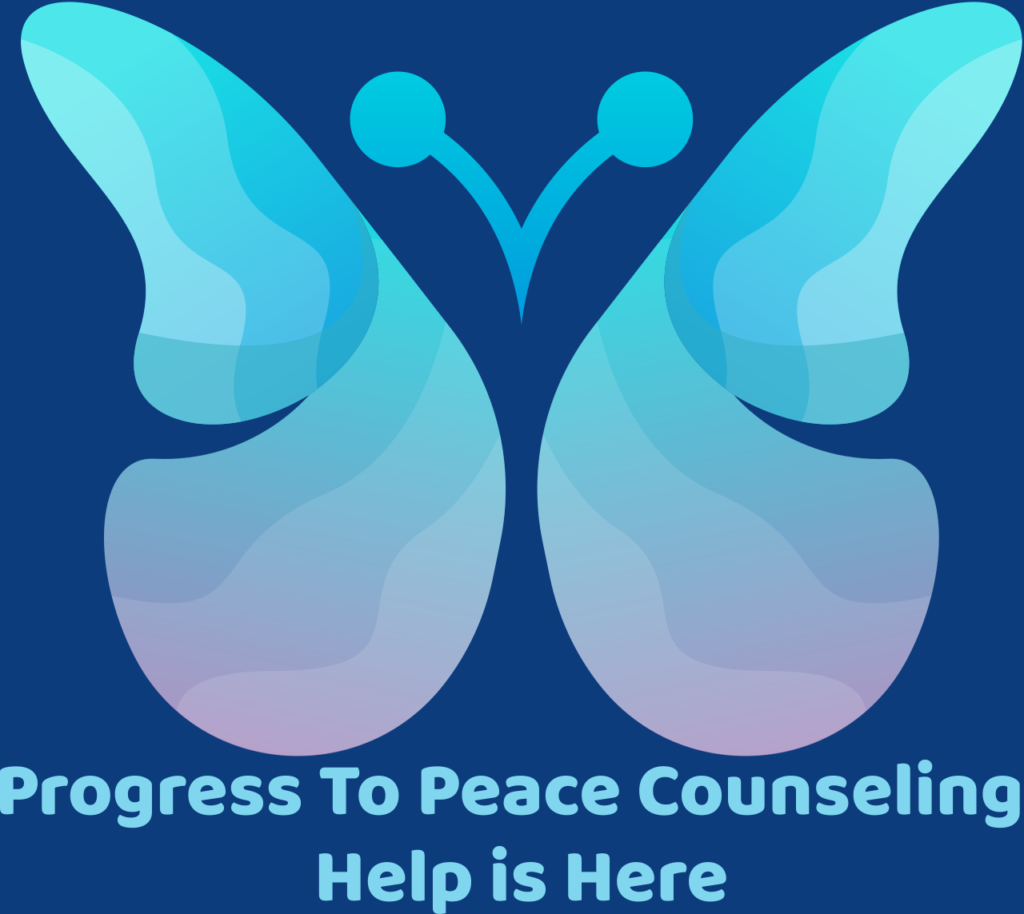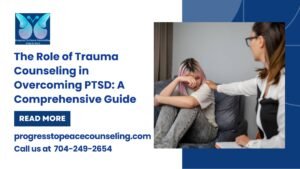Post-horrific Stress Disorder (PTSD) is a serious disorder that has a significant impact on the lives of persons who have been through horrific experiences. Trauma therapy is essential for helping people deal with and overcome the severe symptoms of PTSD. This thorough blog explores the relevance of trauma counseling, its numerous therapeutic modalities, and how it aids in the healing of people living with PTSD. If you want to hire a top rated trauma counseling therapist in Charlotte NC to overcome PTSD, then you can count on the professional experts at Progress To Peace Counseling.
What is trauma counseling?
Trauma counseling is a kind of therapy that aims to help people process and heal from traumatic situations. A trauma counselor creates a secure and supportive setting in which people may express their emotions, ideas, and actions connected to the trauma. The objective is to assist the individual in recovering control of their emotions and thoughts, therefore alleviating PTSD symptoms over time.
Trauma counseling differs from traditional treatment in that it focuses only on trauma-related concerns. Counselors who specialize in trauma have received significant training in understanding how trauma affects the brain, emotions, and body, and they utilize this information to personalize their therapy approach to each individual’s requirements.
Symptoms of PTSD
PTSD appears as a variety of emotional, psychological, and physical symptoms that might differ from person to person. Some common symptoms are:
- Intrusive Thoughts: Recurrent and unwelcome thoughts about the distressing experience.
- Nightmares and flashbacks: Reliving a painful experience in your nightmares or real life.
- Emotional Numbness: An inability to experience emotions or connect with people.
- Avoidance: Avoiding locations, people, or activities that bring back memories of the trauma.
- Cognitive distortions: These are negative ideas about oneself or the world, such as believing the world is dangerous or that they are responsible for the trauma.
The Importance of Trauma Counseling in Treating PTSD
Trauma therapy is important in treating PTSD because it guides people through the recovery process. A trauma counselor helps clients address and resolve unpleasant experiences in a safe and controlled setting. This is critical since many persons with PTSD may try to conceal their experience, which may exacerbate symptoms.
During trauma therapy, clients may expect to focus on the following areas:
-
Processing the Trauma
One of the first tasks in trauma therapy is to assist the person in processing the traumatic incident. Many individuals with PTSD attempt to avoid thinking about or discussing the experience, which may delay recovery. Trauma counselors employ a variety of approaches to assist clients in progressively revisiting unpleasant memories and reducing the emotional charge connected with them. By processing the trauma, the brain may begin to integrate the memory in a manner that decreases its influence on the individual’s everyday life.
-
Developing coping mechanisms
Another important part of trauma treatment is learning appropriate coping techniques. People with PTSD often experience tremendous emotions and physical responses that may be overpowering. Trauma therapy via a trauma therapist provides skills like deep breathing, mindfulness, and grounding exercises to aid with these symptoms.
-
Challenge Negative Beliefs
Trauma may affect how people see themselves, others, and the world. PTSD patients may form ideas like “I’m weak” or “The world is dangerous.” These negative thoughts may reinforce emotions of anxiety, helplessness, and sadness. Trauma therapy assists people in challenging their misguided views and replacing them with better, more balanced ones.
Cognitive Behavioral Therapy (CBT) is a popular technique used in trauma therapy to identify and confront negative thinking patterns. This technique allows clients to reframe their trauma in a more empowered manner, minimizing feelings of guilt or shame and increasing self-compassion.
-
Rebuilding Relationships
Trauma may disrupt relationships, making it difficult for people living with PTSD to trust people or sustain intimate relationships. Trauma therapy tackles the effects of trauma on relationships and assists clients in reestablishing healthy, supportive networks. This frequently entails improving communication skills, expressing feelings, and regaining trust.
Trauma therapist may also include family members or partners in the treatment process to assist them in understanding PTSD and offer the support they need to heal.
Types of Trauma Counseling for PTSD

There are several sorts of trauma counseling procedures, each adapted to the unique requirements of PTSD patients. Some of the most frequent therapy techniques are:
-
Cognitive-Behavioral Therapy (CBT)
CBT is a popular treatment that focuses on recognizing and modifying negative thinking patterns and behaviours. CBT helps people with PTSD reframe their trauma-related thinking and create healthy coping skills.
-
Eye movement desensitization and reprocessing (EMDR)
EMDR is a specialized trauma treatment that involves bilateral stimulation, such as eye movements, to assist people in processing traumatic memories. This strategy reduces the emotional intensity of the trauma, enabling the brain to assimilate the memory without overwhelming the person.
-
Exposure Therapy
Exposure therapy is a kind of CBT in which the subject is progressively exposed to trauma-related ideas, circumstances, or items in a safe and controlled setting. This helps children get desensitized to the trauma and decreases avoidance tendencies.
-
Trauma-focused Cognitive Behavioral Therapy (TF-CBT)
TF-CBT is a kind of cognitive behavioural therapy specifically intended for traumatized children and adolescents. It involves both the client and their caretakers in the therapy process, emphasizing communication and support throughout rehabilitation.
-
Somatic Experience
Somatic Experiencing examines the body’s physical reaction to trauma. It allows people to discharge accumulated stress from their nervous systems via body awareness and physical movement, giving them a feeling of safety and tranquillity.
The Value of Trauma Counseling for Long-Term Recovery
PTSD may be a chronic disorder, but with the correct trauma treatment, people can see dramatic improvements in their symptoms. Trauma therapy gives people the skills they need to process trauma, regulate their emotions, and regain control of their lives.
One of the most significant advantages of trauma therapy is the feeling of empowerment it provides to people. Many individuals who have PTSD believe they have no control over their feelings or memories. Trauma therapy teaches them that healing is possible and that they may actively engage in their own recovery process.
Conclusion
Trauma therapy from Progress to Peace Counseling, plays a key part in recovering from PTSD. It offers people a safe place to process their trauma, acquire coping skills, confront bad ideas, and rebuild their lives. Trauma therapy may be individualized to each individual’s specific requirements using different therapeutic modalities such as CBT, EMDR, and somatic experience, promoting long-term rehabilitation and assisting them in regaining control of their mental and emotional health.
If you or someone you love has PTSD, attending trauma therapy might be the first step toward recovery. Remember that healing is achievable with the proper support and direction.














